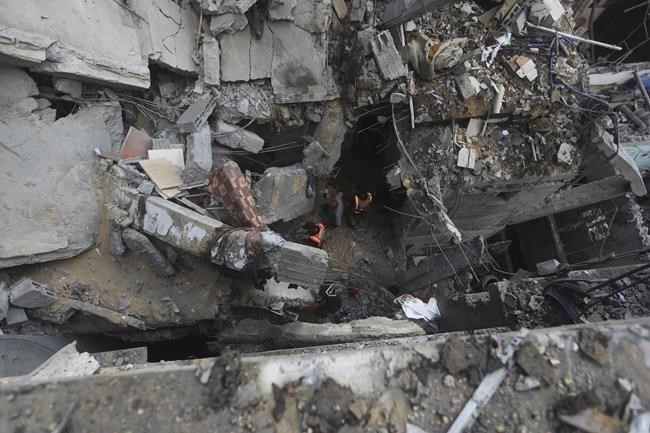ST. JOHN'S, N.L. — More than 7,500 Canadians signed up in the first three months of the year to get family out of Gaza through a federal visa pathway that lawyers have described as onerous, chaotic and nearly impossible to complete.
The numbers obtained by The Canadian Press through a freedom of information request are "shocking," said Debbie Rachlis, an immigration lawyer based in Toronto. She said they show that thousands more Canadians are scrambling to rescue family members from the Israel-Hamas war than Ottawa first estimated when it launched the program in January.
Rachlis, who represents dozens of applicants in the program, said some applications cover seven or eight Gazans in the same family, meaning the actual number of people seeking to get to Canada is even higher. "To me, it's just another indication of how grudging this government's response was to the plight of these people," she said.
The data show Canadians filed 7,549 initial applications, or statutory declarations, to obtain temporary visas for their family members from the day the program opened on Jan. 9 through April 1.
When Immigration Minister Marc Miller announced his department's plans to launch the family reunification program in December, he told a news conference he expected the number of people who might benefit would be "in the hundreds."
From those 7,549 declarations filed, just 179 visas had been issued as of April 29, according to a spokesperson for the Department of Immigration, Refugees and Citizenship Canada.
The process to apply for temporary refuge involves several steps, starting with a statutory declaration from a Canadian family member and an online form with details about their situation. After that, some applicants receive a unique code, and only then can they begin the second stage of the application process.
The family members must cross the Egyptian border from Rafah to Cairo for a final security screening before a visa will be issued, a step that has proved particularly challenging. The Canadian Press has spoken to several Palestinians who, frustrated with Ottawa's inability to help, paid thousands of dollars to a private Egyptian company to shuttle them across the border from Rafah.
Israel's seizure of the border on Tuesday will likely make the crossing even more difficult. "It means we will not be able to get people out, and that’s an extreme concern to me," Miller said on Tuesday.
The data obtained last week show 2,755 unique codes had been issued as of April 1 to those who had filed a statutory declaration. From those who received codes, the department had received 1,977 applications for the second stage of the process.
The federal Immigration Department initially said it would only consider 1,000 applications for the program, prompting an outcry from the National Council of Canadian Muslims and many lawyers, including Rachlis. Miller has since said Canada will consider more, but he has not said how many.
The department said last week that 986 "complete" applications are in processing. Previous emails from the department show that number has not budged since at least March 4.
Rachlis said Canada's apparent hesitation to act with urgency may be attributable in part to it not wanting to contribute to the depopulation of Gaza. And while she termed Canada's visa program a failure, she said no other country has launched a robust initiative that Canada could learn from and there is no international system in place protecting victims of war that Canada could really work with.
Annie O'Dell, a Newfoundland-based immigration lawyer, said Canada could do more to lift some of the visa's excessive security requirements and get the documents to people sooner. She said Ottawa could also stop requiring applicants to travel to Cairo for a final screening because people trying to cross the border from Gaza to Egypt might have an easier time with a Canadian visa in hand.
O'Dell represents Sawsan Karashuli, a Palestinian-Canadian woman in Ontario, who applied in January for a visa for her brother and her niece. The brother has since died of starvation in northern Gaza, and his 25-year-old daughter has been left there alone, O'Dell said. Neither received a visa.
"I do wonder how many of those … applications have gone out for people who are now dead," O'Dell said in an interview. "I would say that the Canadian government does bear some responsibility in the delays to those people who are no longer with us."
Rachlis said that at the very least Ottawa could make an effort to communicate with those who have paid the required government fees, gathered the paperwork and submitted forms and applications in hopes of saving their family members.
She said some received codes immediately, some after months of silence and some have got nothing at all. Others have filed everything, and their family members have paid thousands to get to Cairo and are now waiting in limbo, with no real indication of what may happen to them.
"I feel like this is bare minimum 'how to be a human being' stuff," she said.
This report by The Canadian Press was first published May 8, 2024.
Sarah Smellie, The Canadian Press



